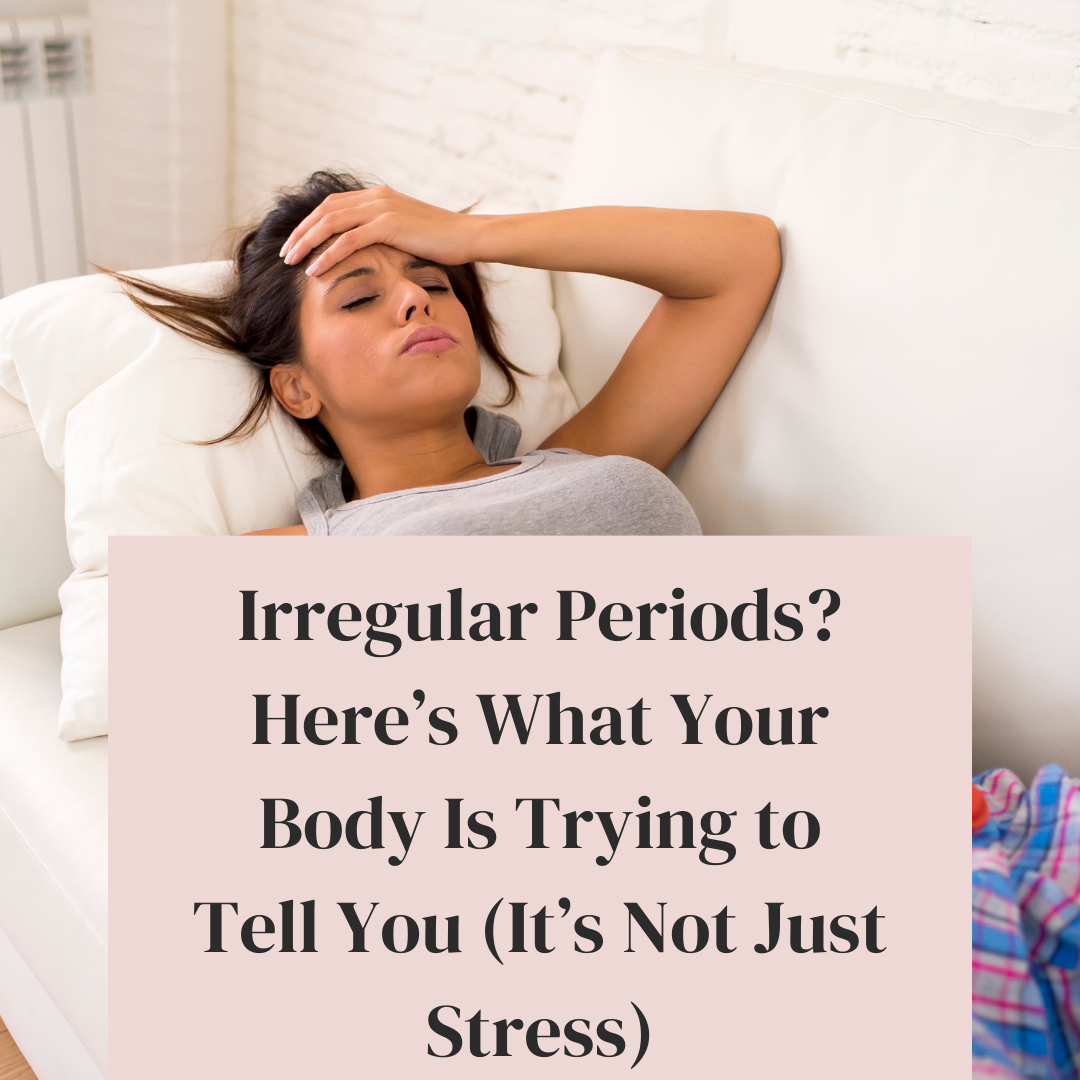
You’ve been there: your calendar’s blank where your period should be. Or maybe it shows up—late, early, disappearing in between. It’s unpredictable. Unreliable. And somehow, always at the worst times.
You tell yourself it’s just stress. Or your work schedule. Or that last pizza binge. But deep down, you’re wondering, “Is something more going on?”
That knot in your stomach? That whisper in your head? Yeah, it’s valid. Because irregular periods hurt. Not just your body but your mood, confidence, and even your sense of control. And when doctors say “it’s stress,” you feel dismissed. Deflated and left alone with questions that won’t quit.
A Must Read: Tired All the Time with PCOS? The Hidden Connection No One Talks About
Let’s unpack what your body might be saying.
Your cycle is smart. It’s not random. It’s a barometer of your whole health. It’s trying to tell you something when it glitches — if you’re willing to listen.
But here’s the truth you’ve probably figured out by now: nobody wants to go back there. Nobody wants to fill out MORE pages of medical intake forms. Nobody wants to sit through more “everything looks normal” doctors’ visits. You want answers that feel real.
You might be thinking:
“Am I broken?”
“Do I just need to try harder?”
“Is this something I’m doing?”
Nope. Wrong question.
Your body isn’t trying to break. It’s speaking.
1. Insulin Resistance & PCOS: The Usual Suspects
For a lot of women with irregular periods, the answer isn’t stress—it’s PCOS and insulin resistance.
When your cells become insulin resistant, your body pumps out more insulin. That extra insulin triggers more testosterone. That extra hormone disrupts ovulation. And just like that, your period goes MIA.
Even if you’re not gaining weight, even if you’re eating “clean”—your hormones might still be at war. And yes, it gets confusing when you’re trying to do everything “right.”
But your body? It’s trying to keep you safe.
It’s sensing inflammation, stress, imbalance—and saying, “Maybe hold off on that appointment, on that work stress, on that pregnancy plan.”
2. Thyroid Might Be on the Sideline
Another common misdirection? Thyroid health.
You’ve probably heard doctors say, “Your thyroid’s fine.” But they might not tell you that fine doesn’t mean optimal.
Subclinical hypothyroidism—or even mild thyroid dysfunction—can delay your period, make your flow heavier or lighter, and wreck your mood.
Picture this: your thyroid is your metabolic engine. If it’s sputtering, nothing else runs smoothly. Not your period. Not your energy. Not your mood.
3. The Stress Hormone Won’t Stick to the Script
Yes, stress does matter. But it’s not just feeling anxious or overwhelmed.
It’s about where your stress hits your body: your brain, ovaries, and pituitary gland.
Stress hormones like cortisol and adrenaline can tell your period to take a vacation. They say: “Not now.”
And if your stress is chronic—work deadlines, family responsibilities, social anxiety—your cycle might be paying the price.
4. Low Body Weight & Over-Exercising
Have you ever been told, “Just lose weight, and your period will return”?
That advice? It works… until it doesn’t.
If you’re underweight, restricting too much, or working out excessively, your body can think you’re in survival mode. And when survival is the priority, periods are optional.
Exercise is incredible—but not when it exhausts your system. Even moderate restriction can slam the breaks on ovulation.
5. Nutrition Gaps & Micronutrient Deficiencies
Think about your last few days of food. Did you get enough zinc? Enough vitamin D? Enough iron, B12, healthy fats?
Periods need more than estrogen and progesterone. They need fuel.
Skimping on nutrition—even without weight loss—can signal to your body that now is not the time. And bam—irregular cycles.
6. Age & Perimenopause (Yes, Even if You’re Younger)
Younger women often assume irregular periods are always about weight or lifestyle. But perimenopause can start in your 30s—even early 40s.
Here’s the kicker: perimenopause is not just about hot flashes and skipped periods. It’s about hormonal fluctuations that can derail your cycle—subtly—over months and years.
Only it feels like a puzzle you never signed up for.
What Your Body Wants You to Know
- You are heard—not lazy, not dramatic, not broken.
- Irregular periods are signals, not silence.
- You don’t have to guess endlessly.
- You can find answers—with clarity, not confusion.
Simple First Steps (That Won’t Feel Overwhelming)
Track your cycle… all of it
Dates are good—but mood, energy, hunger, cravings, emotions—they’re gold.
Check your numbers
Ask for insulin, fasting glucose, TSH, free T3 & T4, vitamin D, ferritin. Blunt question: Are these in a healthy range?
Eat like your period depends on it (because it does)
Focus on stable blood sugar: protein + fiber + healthy fat at every meal. Think: eggs + avocado + veggies. Or Greek yogurt + berries + nuts.
Move—without overdoing it.
Gentle cardio, yoga, walking. Not HIIT seven days in a row.
Sleep like it matters (because it does)
Hormones were restored overnight. Not during your Netflix binge.
When to Ask for Help
- Periods missing more than 3 months
- Pain or heavy bleeding that feels “too much.”
- Hair thinning, excessive hair, acne, sudden weight gain
- Symptoms that make daily life harder than you’d expect
These aren’t overreactions. They’re signs your body needs real attention—not a quick fix.
Wrapping It All Up
Your cycle is trying to tell you something. It’s not random. It’s not saying you’re lazy. It’s not asking you to buy another supplement.
It’s saying:
- I need more balance.
- I need less stress.
- I need fuel.
- I need you to pay attention.
When you stop blaming stress or dieting and start decoding the real message—everything changes. Period symptoms shift. Mood shifts. Flow shifts. Confidence shifts.
It takes listening. It takes small changes. It takes patience. But above all, it takes knowing that your body isn’t broken.
It’s communicating. And finally—finally—you can start to answer.








[…] A Must Read: Irregular Periods? Here’s What Your Body Is Trying to Tell You (It’s Not Just Stress) […]